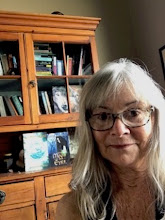Yesterday evening I went to the monthly meeting of the Willamette Writers group here in Portland. The speaker was April Eberhardt, a literary agent who used to work for Andrea Brown Literary Agency and now works with Kimberley Cameron and Associates. Now she also plans to open her own "Agent Press" under her own name. Her target market will be women's book club literature.(More about this later) She spoke for over an hour, fielding questions for the last fifteen minutes or so. She considers herself an advocate for the author and feels that too many books are not making it into print because of the "gatekeepers".
The gist of it? Self-publishing is an option worth looking into. The chance of getting an agent are very slim and on top of that, publishers these days do not always accept the work agents shop to them. I could have been discouraged at that point but instead I began to feel energized. April went through several scenarios and talked about the pros and cons of each. Self-publishing had the most pros and least cons. I'll try to go through this a bit in detail.
1. Publishing houses have all rights over the work--this includes cover, editing changes, e rights which is an important one. Their advances are small to nil. The author must market and many times pay their way to book promotion tours. Getting the book from acceptance to shelf can take two years or more. (I, for one, do not have that kind of time.) If the author wants to write a book in another genre it is discouraged. If the first book is not an enormous success they will not publish book #2, or if they do their help is non-existent.
2. Independent presses are another option. They give the author the legitimacy of having their work picked up. Again they take a long time to respond, advances are non-existent, all marketing is done by the author who will most likely not make a profit. One must research these entities carefully.
3. Self-publishing gives the author full control over his or her work. It will cost approximately $2 to $3000 to publish. The author makes money right away. The web offers many marketing tools and allows the author a chance to experiment on what works and what doesn't for little to no investment. The negatives are still the stigma that exists about self-publishing but this is rapidly changing. April's caution, however, is that the work must be well-written and edited properly.
4. April mentioned one more up and coming "hybrid" model. This is the Agent Press. Some agents are developing websites for certain types of books. Again, the author designs the cover and does the editing. April is delving into this herself and most likely will have more information to offer on her website.
I am beginning my own research into the 'agent press' and the self-publishing world to decide where to head with my book. This will be an ongoing topic as I collect information to share. I am hoping to interview a few self-published authors on my blog as well.

There you are! Now I see your blog. May I suggest you put your name on it somewhere. Your interview with the agent going freelance is spot on. But I don't quite understand what an "Agent Press" is. What's confusing me is the word Press unless it's a magazine.
ReplyDeleteI've self-published 3 books because the wait to be picked up is too long, and nearly non-existing for people of color.
I think you're off to a good start with your blog. Wishing you the best, Minnie Estelle